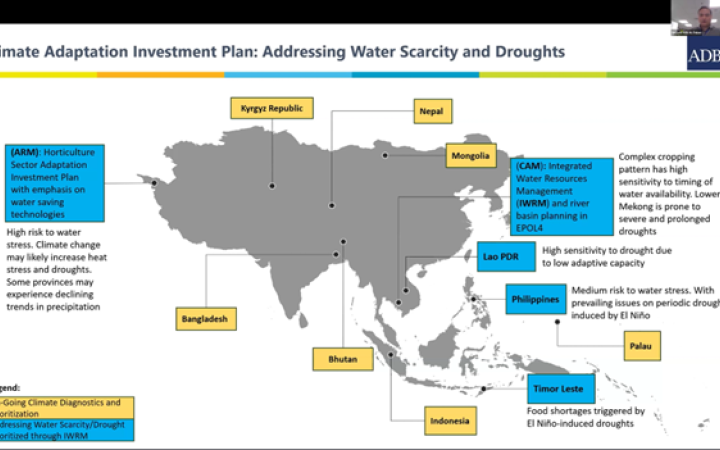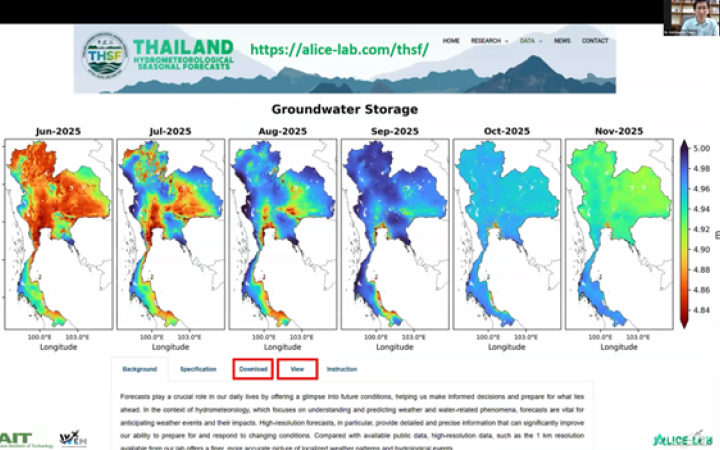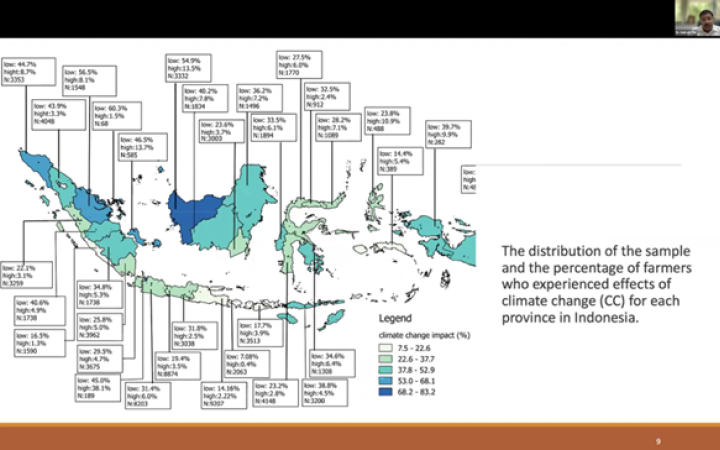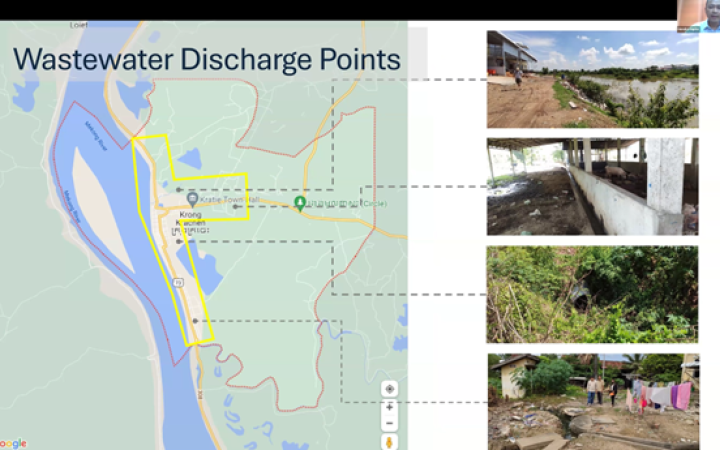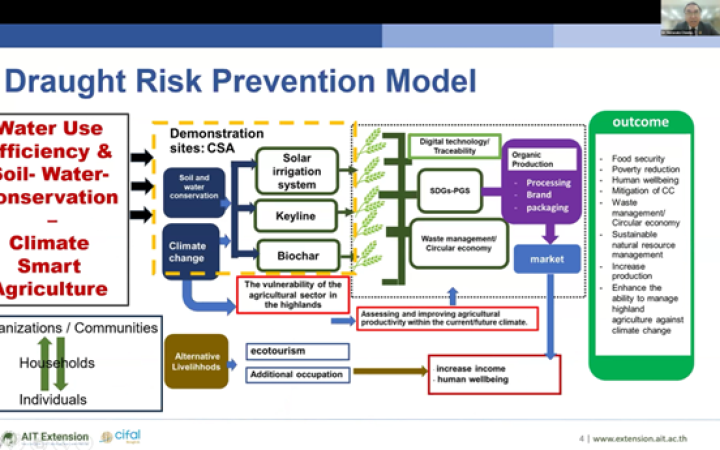Geneva, Switzerland - In observance of global efforts to address rising water stress and the World Day to Combat Desertification and Drought , the UNITAR Global Water Academy , the Global Water and Sanitation Center , and CIFAL Bangkok at the Asian Institute of Technology (AIT) co-hosted a virtual event titled 'Streams of Change: Water Scarcity Solutions - Managing Drought Risks'. The session brought together experts in climate resilience, drought mitigation, sustainable agriculture, and water infrastructure to explore practical and technological responses to global water scarcity.
The event highlighted how water shortages currently affecting over 36% of the global population are projected to intensify, potentially impacting 5 billion people by 2050. Throughout the discussions, panelists emphasized the direct and indirect consequences of water scarcity, such as biodiversity loss, ecosystem degradation, and climate feedback effects.
Opening Remarks
The panellists included:
- Prof Manukid Parnichkun, Vice President for Academic and Research, Asian Institute of Technology
- Dr Ebru Canan-Sokullu, Senior Resource Mobilisation Specialist, UNITAR
- Dr Leo Kris M. Palao, Associate Climate Change Officer, Asian Development Bank
- Dr Natthachet Tangdamrongsub, Assistant Professor, Asian Institute of Technology
- Mr Hendra Gupta, Global Water and Sanitation Centre, Asian Institute of Technology
- Dr Voravate Chonlasin, Director, CIFAL Bangkok, Asian Institute of Technology
- Dr Gopi Krishna, Affiliate Faculty, Asian Institute of Technology
In his opening remarks, Prof. Parnichkun emphasised:
We try to address the challenges of water scarcity and desertification, which affect livelihoods, natural resources, ecosystems, and economies around the world. So, today's webinar aims to explore innovative technologies and policies to mitigate drought and manage water effectively to minimise the list of hazards from drought and lessen the impact of the water scarcity crisis.
Dr Canan-Sokullu further stated:
Drought does not have to become a disaster, but it will, if we do not act. Water scarcity is not only an environmental issue; it is a development, security, and equity issue.
Asian Development Bank Initiatives on Water Scarcity and Drought Resilience
Dr Palao outlined the Asian Development Bank's (ADB) comprehensive approach to managing water scarcity and promoting sustainable water resource use in the face of climate change. By highlighting the severe hydrological impacts of climate change, including glacial melt, increased drought, and extreme weather, he emphasised the urgent need for integrated water resources management (IWRM) , especially in vulnerable regions such as Central Asia and parts of Southeast Asia.
ADB's interventions range from supporting national adaptation plans to financing climate-informed investment projects that improve water infrastructure, promote water-saving technologies, and enable risk-adapted agricultural practices. Through Dr Palao's presentation, he provided examples of adaptation planning in Armenia and Cambodia, climate risk assessments in Georgia and Uzbekistan, and a major inter-basin water transfer project in Sri Lanka designed to redistribute surplus water from wet to arid zones.
Tackling Water Data Scarcity with High-Resolution Modeling in Thailand
Dr Tangdamrongsub discussed the urgent challenge of water data scarcity and the development of high-resolution, forecast-capable modelling systems to support water resource management in Thailand and beyond. Current public and satellite datasets often lack critical variables like groundwater and are spatially or temporally limited, making them insufficient for local-scale applications.
To address this, Dr Tangdamrongsub and his team developed the Thailand Hydrometric Seasonal Forecast (THSF) system , which provides 1-kilometre resolution water data with 6-month forecasts, updated weekly and freely available to the public.
This system was built using open-source platforms and powered by supercomputers, which offer detailed simulations for various hydrological variables, supporting agricultural planning, climate adaptation, and local decision-making. Despite challenges such as the need for advanced computing skills, substantial resources, and consistent funding, the system opens global opportunities for collaboration, AI integration, and knowledge sharing across the open-source and water research communities.
Climate Hazards, Water Scarcity, and Displacement in Southeast Asia
Dr Indrajit Pal explored the intersection of climate hazards, water scarcity, and internal displacement in Southeast Asia, with a particular focus on Indonesia. He highlighted how climate-induced hazards, especially droughts and floods, are displacing millions of people annually, with Indonesia among the most severely affected.
Through qualitative and quantitative research involving household surveys and stakeholder interviews, his team identified key environmental and socio-economic drivers, such as livelihood insecurity, agricultural disruption, and lack of water access, that force communities to migrate.
He emphasised that climate change is not only exacerbating existing vulnerabilities but also altering land use, disrupting food systems, and making adaptation increasingly difficult or ineffective. Dr Pal introduced a new initiative led by IOM, AIT, and the University of the Philippines Resilience Institute to develop a Risk Index for Climate Displacement (RICD) , aimed at mapping climate risk drivers and generating granular data for policy and planning. He concluded by urging a deeper understanding of tipping points that lead from in-situ adaptation to forced migration, emphasising the need for early action and integrated risk governance.
Water-Sensitive Urban Planning in Secondary Cities of Southeast Asia
Mr Gupta presented findings from the Poly Urban Waters Project , which supports secondary cities in Southeast Asia in developing sustainable and water-sensitive urban strategies.
Focusing on Kratié, Cambodia, a riverside city situated along the Mekong River, Gupta highlighted the paradox of water abundance and scarcity: despite being located near one of the world's great rivers, Kratié suffers from seasonal droughts, water scarcity, and severe flooding. He emphasised the importance of adopting polycentric and integrated water management approaches that consider both infrastructure and natural systems.
The city's rapid expansion, poor wastewater treatment, and degradation of wetlands threaten its long-term resilience. The project proposes a combination of centralised and decentralised wastewater solutions, integration of water into urban planning, preservation of flood-prone natural areas like lakes, and improved solid waste management. Gupta called for water to be treated as a strategic cross-cutting issue, urging cities to embed resilience, biodiversity, and climate adaptation in their development plans.
Smart Agriculture for Drought Resilience in Thailand
Dr Chonlasin presented a comprehensive initiative addressing water scarcity and drought in Thailand's highlands through a technology-enabled smart agriculture project supported by the Asian Development Bank.
The project integrates climate-smart devices, data analytics, and community engagement to empower small-scale farmers in northern Thailand to manage unpredictable rainfall, drought, and water availability.
Using connected devices, such as solar irrigation systems and soil moisture sensors, farmers gain timely information to make decisions on crop selection, irrigation, and risk mitigation. Dr Chonlasin emphasised that the project serves to provide capacity building for local communities, institutions, and governments to interpret and act on climate risk data.
Closing Remarks
Dr Gopi Krishna concluded the session by highlighting that the discussions emphasised utilising policy strategies, innovative technologies, and community-based approaches essential for mitigating drought risks and improving water management. He further encouraged continued engagement to act on the policies and strategies addressed in this session to prevent the risks of drought and desertification.

